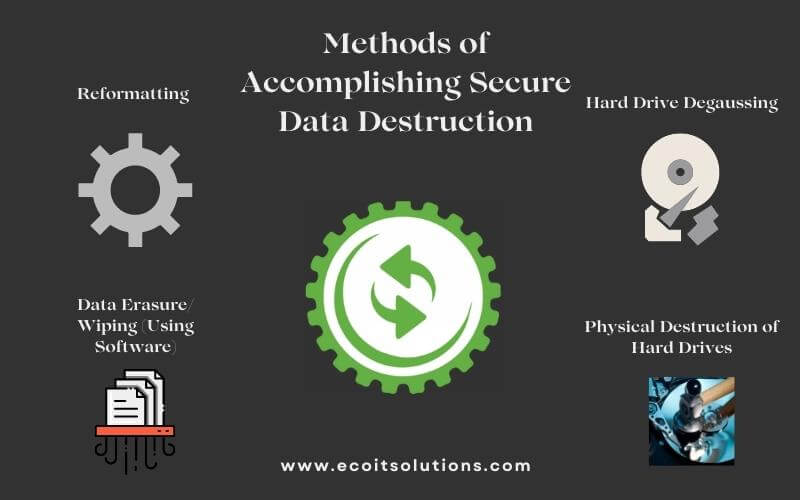Data Destruction Solutions: A Key Element in Your Cyber Security Approach
Data Destruction Solutions: A Key Element in Your Cyber Security Approach
Blog Article
The Value of Effective Data Devastation Practices in Shielding Sensitive Information and Ensuring Computer Safety
In an era where information breaches are progressively common, the significance of reliable data devastation methods can not be overemphasized. Organizations face significant threats when delicate info is inadequately gotten rid of, potentially bring about unapproved access and severe financial repercussions. Implementing durable data devastation techniques not just reduces these risks however also lines up with legal conformity requirements, making sure that organizations copyright their track record and foster customer count on. Nevertheless, the inquiry continues to be: what certain methods can be employed to improve these practices, and how can companies successfully incorporate them into their total cybersecurity structure?
Comprehending Information Damage
Comprehending information devastation is vital in today's digital landscape, where sensitive information can easily be jeopardized. Effective information damage entails not just making certain but deleting data that information is irretrievable via comprehensive methods. This procedure is important for organizations that take care of confidential client info, intellectual building, or interior records, as any type of violation can cause extreme financial and reputational effects.
Data damage incorporates different techniques, consisting of shredding physical media, degaussing magnetic storage devices, and using software-based remedies that overwrite information numerous times. Each method offers a specific purpose and has to straighten with the sensitivity of the details being dealt with. For instance, physical damage is commonly favored for hard disk drives including very confidential data, while software application techniques may be sufficient for much less delicate info.
Moreover, sticking to sector criteria and guidelines, such as the General Data Defense Law (GDPR) or the Medical Insurance Mobility and Accountability Act (HIPAA), is important for compliance and to minimize lawful dangers. Organizations must create a durable data damage policy, train employees on best techniques, and routinely audit their treatments to make sure that all sensitive info is dealt with securely and properly.
Dangers of Inadequate Practices
Insufficient data devastation practices subject organizations to considerable threats that can have far-reaching consequences. When delicate info is not correctly dealt with, it stays susceptible to unapproved access, which can lead to data violations and identity theft. Such incidents not just compromise the safety of people however likewise tarnish the organization's reputation, causing a loss of customer count on and prospective financial consequences.
Additionally, governing conformity is progressively stringent in many industries. Failure to comply with data destruction regulations can result in hefty penalties and lawsuits against organizations. These charges can stress monetary resources and divert focus from core company procedures.
In addition, the abuse of recurring data can result in intellectual home theft or corporate reconnaissance, endangering competitive benefits (data destruction). The influence of insufficient data devastation expands past instant financial losses; it can also cause lasting damages to brand integrity and market position

Organizations must identify that data safety and security is not entirely regarding stopping violations; it additionally incorporates the responsible management of data throughout its lifecycle. Overlooking effective data devastation protocols can have tragic effects, emphasizing the need for robust steps to alleviate these risks.
Finest Practices for Information Destruction
Carrying out reliable data damage techniques is necessary for guarding delicate details and keeping conformity with regulatory requirements. Organizations should adopt a multi-faceted strategy to ensure that data is irretrievable, therefore preventing unauthorized accessibility and potential breaches.
First, data must be classified based upon sensitivity, enabling companies to use suitable damage approaches customized to the level of danger. For digital data, utilizing software-based data-wiping devices that adhere to industry requirements can effectively overwrite existing information. Physical destruction approaches, such as shredding or degaussing, are important for gadgets that store sensitive info, ensuring full removal.
Establishing a clear information retention policy is crucial, detailing the length of time different kinds of information need to be kept before devastation. Routine audits of information storage systems are additionally essential to identify obsolete or unnecessary information needing elimination.
Moreover, training employees on the value of information destruction and the certain protocols to follow fosters a culture of protection within the organization. Lastly, maintaining paperwork of information damage refines offers liability and sustains conformity with external guidelines and inner policies. By adhering to these best practices, companies can dramatically minimize the dangers connected with information exposure.
Legal and Compliance Factors To Consider

Failure to abide with these regulations can result in serious charges, consisting of significant penalties and reputational damage. Organizations should apply a durable data damage plan that straightens with these lawful frameworks and offers clear standards on the proper methods of data disposal, whether physical shredding or digital wiping.
Moreover, preserving documents of information devastation activities is crucial for showing conformity during audits or inspections. By focusing on lawful and compliance factors to consider, companies can improve their information security pose and foster count on with stakeholders and customers, eventually adding to an extra protected information management atmosphere.
Benefits of Effective Information Destruction
Effective data damage practices extend beyond plain compliance; they offer considerable advantages to organizations that prioritize them. By making sure that delicate details is irretrievably ruined, companies minimize the risk of information violations and the possible monetary effects associated with them. This positive technique not just safeguards against unauthorized gain access to yet you could try this out likewise improves the overall trustworthiness of see here the company in the eyes of customers and stakeholders.
Executing robust information destruction approaches, such as physical damage of storage gadgets or advanced information wiping strategies, adds to the strengthening of a company's cybersecurity stance. data destruction. It minimizes the probability of copyright burglary and protects exclusive information, thereby preserving a competitive edge in the marketplace
Conclusion
In final thought, efficient information devastation methods are necessary for safeguarding sensitive info and improving overall computer security. By carrying out comprehensive techniques such as shredding, degaussing, and software overwriting, organizations can reduce the dangers connected with unauthorized gain access to and information violations. Adherence to regulatory requirements, consisting of GDPR and HIPAA, more reinforces compliance and safeguards versus lawful repercussions. Ultimately, a commitment to robust information destruction methods fosters a society of responsibility, thus enhancing a company's cybersecurity stance and maintaining client trust.

Report this page